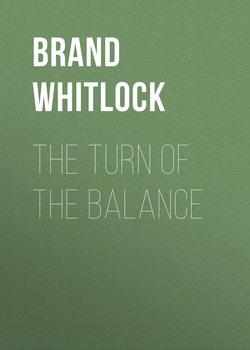Читать книгу The Turn of the Balance - Brand Whitlock - Страница 19
BOOK I
XVII
ОглавлениеCurly Jackson sat for a moment idly making little circles on the polished surface of the table with the moist bottom of his glass; then abruptly he rose and left the room. The others followed him with their eyes. Archie was deeply interested. He longed to talk to Jackson, longed to show him how he admired him, but he was timid in this company, and felt that it became him best to remain quiet. But Jackson's conduct in the tragedy had fired Archie's imagination, and Jackson was as much the hero in his eyes as he was in the eyes of his companions. And then Archie thought of his own skill with the carbine and the revolver, and he wished he could display it to these men; perhaps in that way he could attract their notice and gain their approval.
"He doesn't want to talk about it," said Mason when Jackson had disappeared.
"No," said Gibbs. "Let him alone."
Jackson was gone but a few minutes, and then he returned and quietly took his seat at the table. They talked of other things then, but Archie could understand little they said, for they spoke in a language that was almost wholly unintelligible to him. But he sat and listened with a bewildering sense of mystery that made their conversation all the more fascinating. What they said conveyed to him a sense of a wild, rough, dangerous life that was full of adventure and a kind of low romance, and Archie felt that he would like to know these men better; if possible, to be one of them, and at the thought his heart beat faster, as at the sudden possibility of a new achievement.
As they talked voices were heard in the bar-room outside, and presently a huge man stood in the door-way. He was fully six feet in height, and blond. His face was red, and he was dressed in dark gray clothes, a blue polka-dotted cravat giving his attire its one touch of color. He reminded Archie of some one, and he tried to think who that person was.
"Oh, Dan," the man in the doorway said, "come here a minute."
Gibbs went into the bar-room.
"Who's that?" asked Mandell.
"He's a swell, all right," said Keenan.
The three, Mandell, Keenan and Jackson, looked at Mason as if he could tell. But Archie suddenly remembered.
"He looks like an army officer," he said, speaking his thought aloud.
"What do you know about army officers, young fellow?" demanded Jackson. The others turned, and Archie blushed. But he did not propose to have Jackson put him down.
"Well," he said with spirit, "I know something–I was in the regular army three years."
"What regiment?" Jackson fixed Archie with his blue eyes, and there seemed to be just a trace of concern in their keen, searching glance.
"The twelfth cavalry," said Archie. "I served in the Philippines."
"Oh!" said Jackson, as if relieved, and he released Archie from his look. Archie felt relieved, too, and went on:
"He looks just like a colonel in the English army I saw at Malta. Our transport stopped there."
"It's Lon McDougall," said Mason when Archie had finished. "He's a big-mitt man."
The others turned away with an effect of lost interest and something like a sneer.
"I suppose there's a lot o' those guns out there," said Keenan.
"A mob come in this afternoon," said Mason; "they're working eastward out of Chicago with the rag."
"Well, let's make a get-away," said Keenan, unable to conceal a yegg man's natural contempt of the guns.
They all got up, Archie with them, and went out. In the bar-room five men were standing; they were all men of slight figure, dressed well and becomingly, and with a certain alert, sharp manner. They cast quick, shifty glances at the men who came out of the back room, but there was no recognition between them. These men, as Mason had said, were all pickpockets; they had come to town that afternoon, and naturally repaired at once to Gibbs's. They had come in advance of a circus that was to be in the city two days later, and were happy in the hope of being able to work under protection. They knew Cleary as a chief of police with whom an arrangement could be made, and McDougall, who had come in to work on circus day himself, had kindly agreed to secure them this protection. At that moment, indeed, McDougall was whispering with Gibbs at the end of the bar; they were discussing the "fixing" of Cleary.
The pickpockets had been talking rather excitedly. They were glad at the prospect of the circus, and, in common with the rest of humanity, they were glad that spring had come, partly from a natural human love of this time of joy and hope, partly because the spring was the beginning of the busy season. They could do more in summer, when people were stirring about, just as the yegg men could do more in winter, when the nights were long and windows were closed and people kept indoors. But at the appearance of Mason and his friends, one of the pickpockets gave the thieves' cough, and they were silent. McDougall glanced about, then resumed his low talk with Gibbs.
